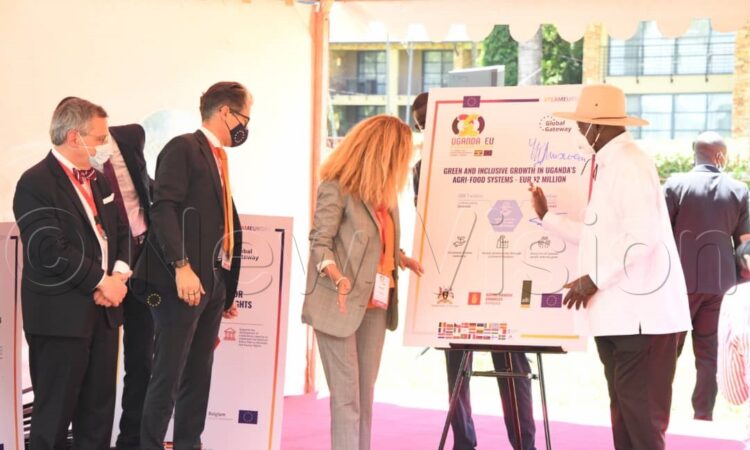
In a move aimed at stimulating economic growth, President Yoweri Museveni has signed eight financial agreements with the European Union (EU) worth €218 million (about shillings 932 billion).
The signing took place on Wednesday, March 6, 2204, where Museveni made a pointed appeal for collaboration at the ongoing third Uganda-EU Business Forum that is being held at Speke Resort Munyonyo, Kampala.
The eight financial initiatives aim to among others, contribute to the reduction of human rights abuses particularly those impacting women, in business activities in Uganda, and boost value addition and agro-processing by unlocking affordable medium-term financing to agribusiness SMEs in Uganda.
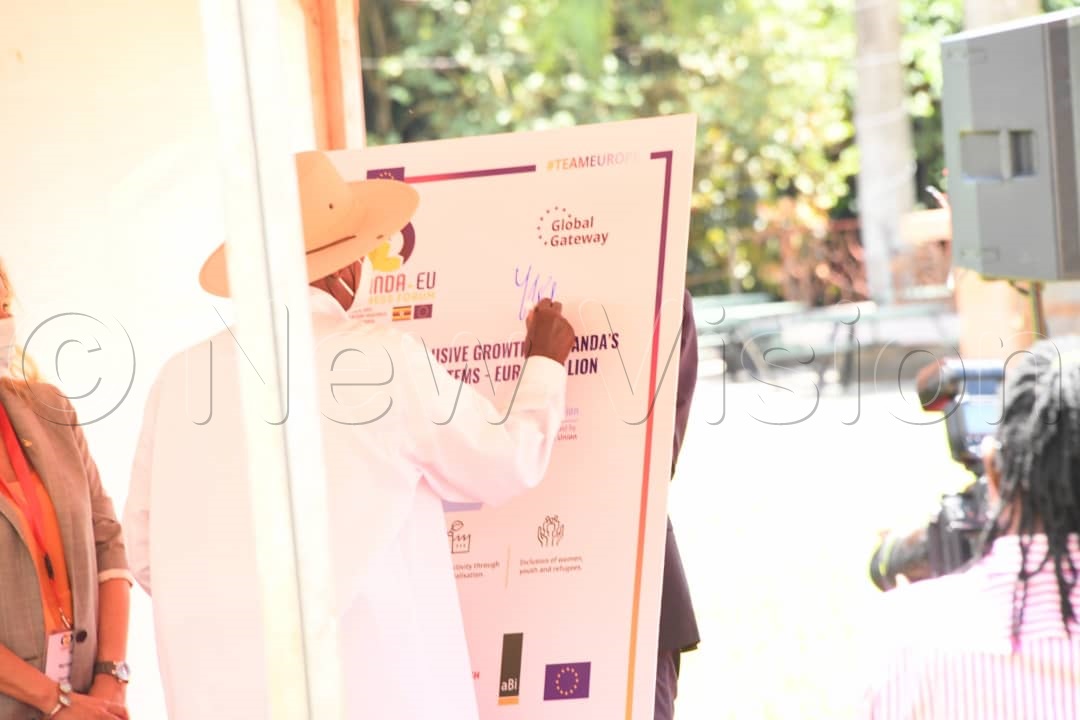
“Over 100 companies are represented with the objective of attracting investment and increasing trade in Uganda.
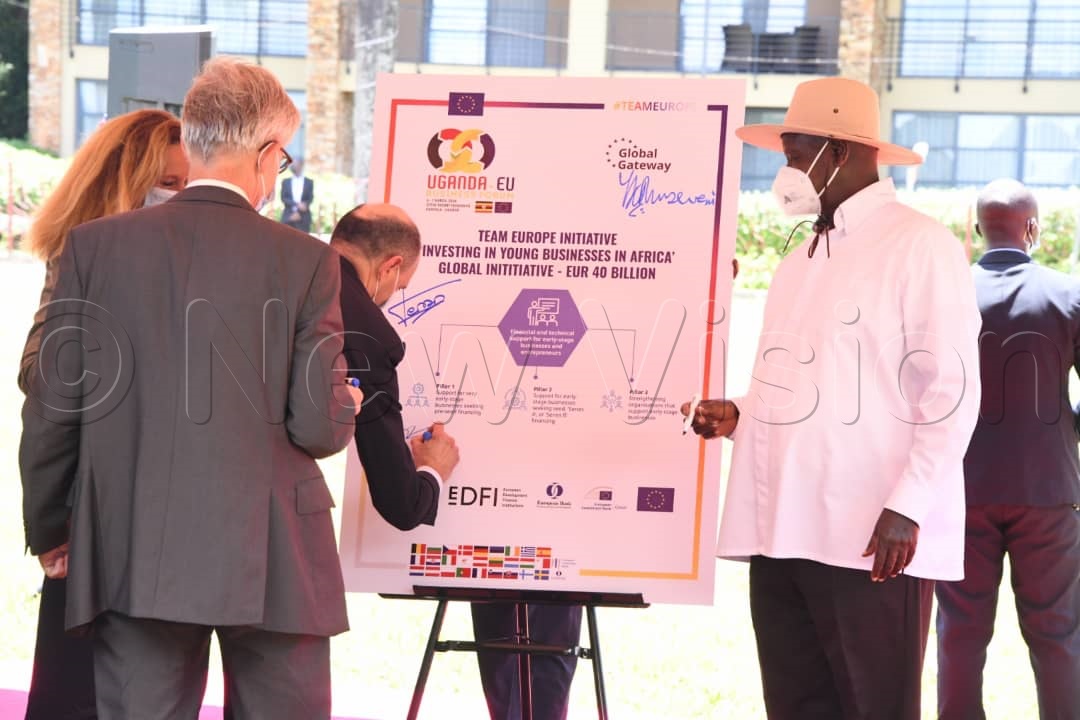
The summit which closes today, Thursday, 7, 2024, attracted over 3,700 participants taking part both physically and online according to Evelyn Anite, the State Minister of Finance for Investment and Privatization.
According to Sadek, the high-level forum themed: Boosting Trade and Investments: What can Uganda gain from the Global Gateway, serves as a platform for collaboration between Ugandan and European businesses and government representatives.
Financial initiatives
Green and decent jobs for youth WeWork (Euros 50 million)
The project aims to enhance the employability of vulnerable youth, including women as well as their access to green and decent employment opportunities.
To address the youth employment challenge, the project takes an integrated approach towards both the supply and demand side of the labour market according to the EU team.
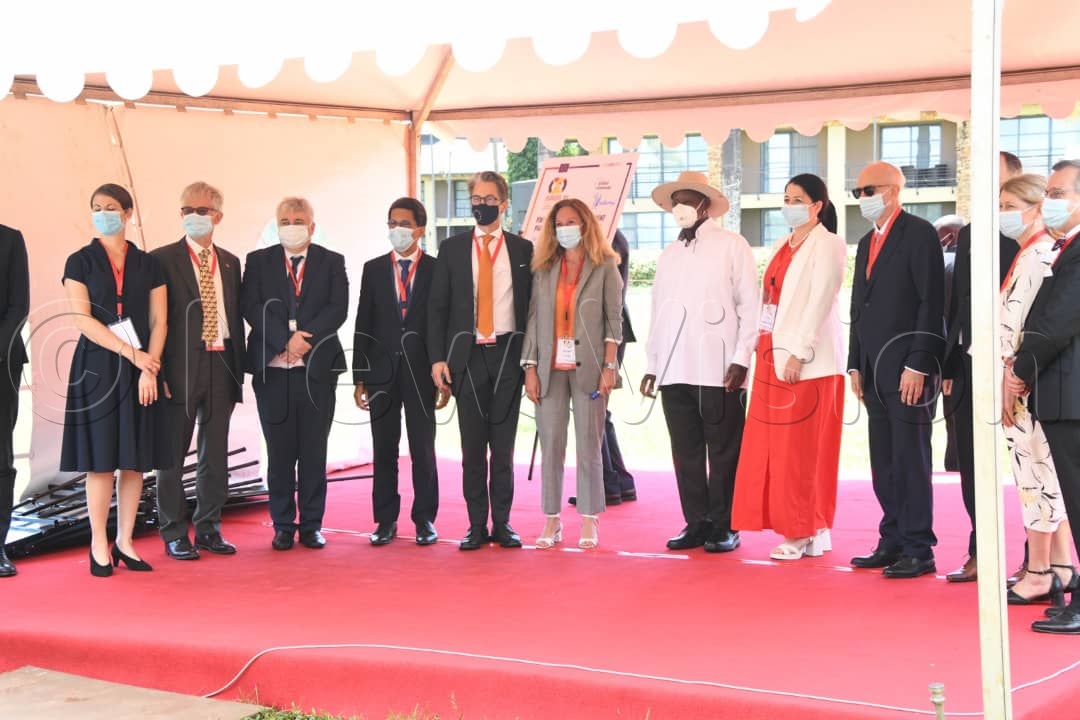
Self-employment is also a key pathway supported by the project. Additionally, the project will provide employment services to ensure that work-ready youth find their way in the labour market and enable employers to easily find skilled labor. The Belgium and EU project will be implemented by Enabel.
Advancing Respect for business and Human Rights (ARBHR) in Uganda (Euros five million)
According to the team from Europe, the aim of ARBHR is to contribute to the reduction of human rights abuse, particularly those impacting women, in business activities in Uganda.
The project supports the development of institutional capacity to implement the National Action Plan on Business and Human Rights, works closely with businesses to improve awareness and engagement of the private sector on the BHR agenda in Uganda and supports civil society advocacy, dialogue, and engagement with communities.
It will be implemented by Enabel /Belgium, in partnership with the Ministry of Gender, Labour and social Development, other government MDAs, private sector organizations and civil society organizations.
Agricultural Revitalization & Transformation (START) Facility (EUR 11.5m)
START aims to boost value addition and agro-processing by unlocking affordable medium-term financing to agribusiness SMEs in Uganda, with special consideration given to SMEs that impact vulnerable groups and SMEs that promote environmentally sustainable practices.
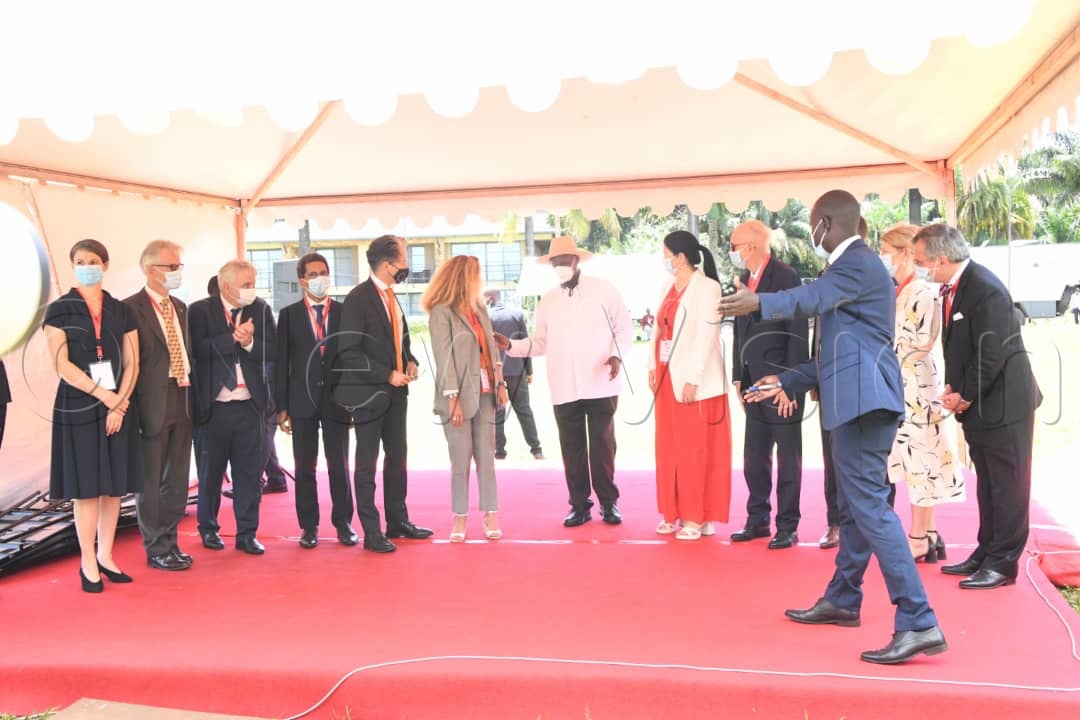
START is a blended finance facility offering a tailored blend of business development services and financial products, including concessional and zero-interest loans, technical assistance grants, and partial credit guarantees according to the team from Europe.
The project will be implemented between 2023-2027 enabling over 300 SMEs across the country to access financing ranging from EUR 10,000 – 200,000 in form of grants, concessional loans, and commercial loans. Implemented by UNCDF.
Women Entrepreneur for Africa programme within the Team Europe Initiative ‘Investing in Young Businesses in Africa’ (TEI IYBA) Regional Initiative (mobilising Euros 40 million)
The Team Europe initiative ‘Investing in Young Businesses in Africa’ (TEI IYBA) helps early-stage businesses and young entrepreneurs in Africa to launch and grow sustainable, strong, and inclusive businesses, and create decent jobs.
It does so by extending financial and technical support to businesses and entrepreneurs in their early stages, and strengthening the ecosystem of organizations that support them.
It is supported by the European Bank for Reconstruction and Development, and the Association of European Development Finance Institutions.
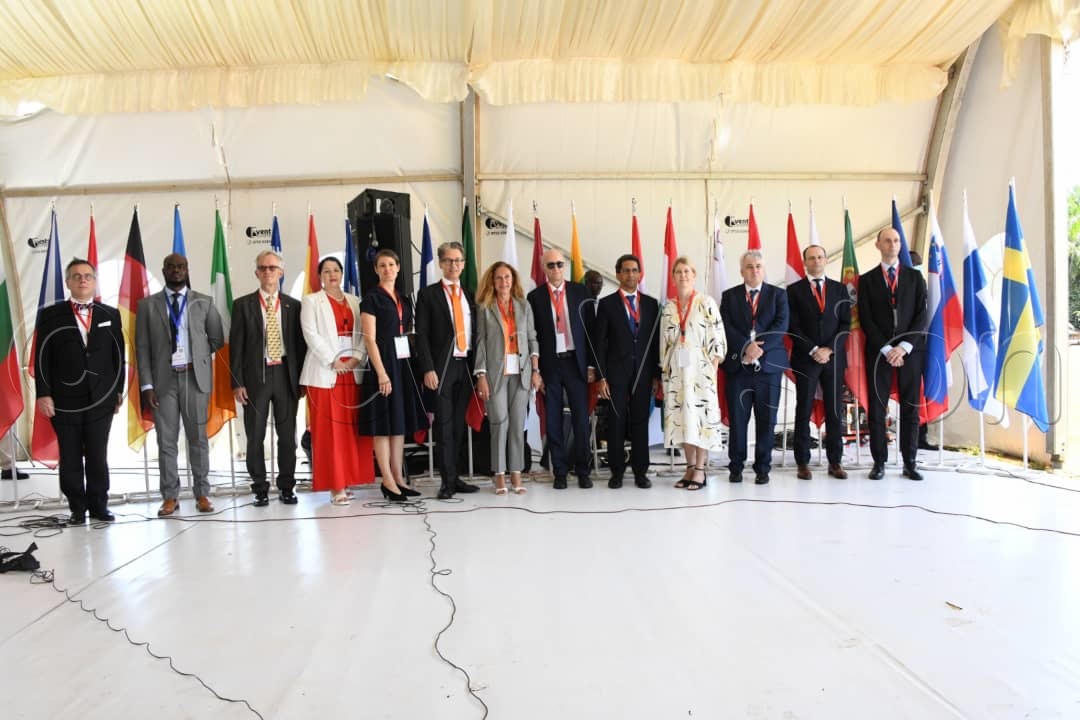
EIB loan to Centenary Rural Development Bank Uganda (EUR 50m)
The project relates to the on lending of EUR 50nn to micro entrepreneurs and micro enterprises with a focus on female borrowers (50 percent) and clients in rural areas (60 percent)
Furthermore, the loan will contribute significantly to the objectives of the Team Europe Initiative -Sustainable Business for Uganda” (SB4U) and -Investing in Young Businesses in Africa, by generating loans (expected, over the maturity of the EIB enterprises with a focus on female borrowers (50%., and clients in rural areas 60 percent).
EIS loan to Housing Finance Bank (EUR 25m)
This loan aims at providing financing to Housing Finance Bank (HFB) for onward lending to a number of private sector entities, mostly small and medium-sized enterprises (SMEs), and with a particular focus on eligible businesses run and/or managed by women.
According to the team from Europe, the project will contribute to enhancing access to suitable medium and long-term finance for private SMEs across various sectors including manufacturing, services, and trade.
EIB loan to TOWERCO OF AFRICA UGANDA (EUR 25m)
The EU delegates said, the Global Gateway project supports the construction of 675 new mobile towers in Uganda.
With the fund, they said that at least 50% of the towers will be in rural areas where there is no mobile service coverage currently, while the rest will provide additional capacity in areas where the current mobile networks are saturated.
Project cost is estimated at EUR 76.2m. The Bank’s contribution to the financing will not exceed the usual proportion for this type of project and is expected to be EUR 25 million.
aBI-Green and inclusive growth in Uganda’s agri-food systems (EUR 12m)
Second phase of this Agriculture Business Initiative focuses on: increase agricultural production & value addition by extending matching grants & Business Development Services 1111) to agribusinesses, farmer organizations & intermediaries to enhance planning & management, production & business infrastructure, as well as upstream & downstream market linkages of producers & agribusinesses.
It aims to create better lives for at least 200,000 farmers, increased climate resilience, higher productivity through commercialization and inclusion of women youth and refugees.
President’s address
President Museveni, addressing a gathering that included EU ambassadors, groups of investors from across EU which include among others, France, German, Netherlands, Ireland, Sweden, emphasized the need for “dialogue, not political chauvinism”.
He started his address by alluding to three strategies that make an enterprise make profits. And he noted that the higher the profits the better.
He said: “Therefore, when we are talking about businesses, we should look at the level of profitability of businesses in this part of the world, compared to Europe, compared to Asia, and other investment destinations. I think Uganda Investment Authority should be able to give you those figures.”
Unfair labour division
Museveni also hinted on the Karl Marx theory that fronted the idea of labour as the most important factor of production, which Museveni said was only partially right and not wholly.
He noted that if you only think of labour and forget entrepreneurship, capital, natural resources, then you are only partially tackling the issue of wealth creation,” he noted.
He told the business community to push political actors to wake up and stop wasting the opportunities for the countries.
Accordingly, Museveni said that the unfair division of labour is inhibiting business. He said if people don’t have money in their pockets, they can’t buy products from the rest of the world.
He said the inhibitors of business have been the unfair division of labour in the world, where some places like Latin America produce the raw materials and they are taken to the USA to be processed into finished products. He said this is very dangerous.
He said the European Businesses coming to invest in Uganda is common sense and a good strategy. But he noted that the non-tariff barriers created by bad politics are also inhibiting business.
“We need to advise the government from the EU to stop that mistake because there is no way you can control the world politically. You can’t do it, and you should not even attempt to control the world politically,” he said.






